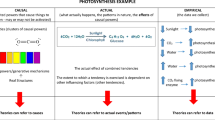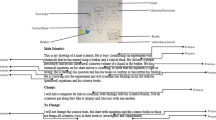Abstract
This article addresses two gaps in the literature related to science department chairs: the axiological relationship between the chair and science, the subject, and the perceptions of the chair with respect to teaching and learning within their departments. In this work, axiology is used to understand how the chair’s values toward the subject influenced his own perceived capacity to lead learning within his department in a reformed discourse. A narrative inquiry methodology was used to consider the chair’s experiences in the development of his identify over his life span in the form of two stories: (1) the relationship between the chair and science, the subject, and (2) the perceptions of the chair with regards to teacher learning within the department. The findings revealed that the work and career of the chair in this study were authored by strong elements of personal continuity and points of stability around the valuing of science, the subject, even as this valuing evolved from being more focused on epistemic values early in his career, to being more concerned with universal values connected to his legacy and his department later in his career.
Similar content being viewed by others
References
Aikenhead, G. (2006). Science education for everyday life. New York: Teachers College Press.
Avraamidou, L. (2014). Tracing a beginning elementary teacher’s development of identity for science teaching. Journal of Teacher Education, 65(3), 223–240.
Bennett, N., Newton, W., Wise, C., Woods, P., & Economou, A. (2003). The role and purpose of middle leaders in schools. Nottingham: National College for Teaching and Leadership.
Baddeley, J., & Singer, J. A. (2007). Charting the life story’s path: narrative identity across the life span. In D. J. Clandinin (Ed.), Handbook of narrative inquiry: Mapping a methodology (pp. 177–203). Thousand Oaks, CA: SAGE Publications.
Bluck, S., & Glück, J. (2004). Making things better and learning a lesson: experiencing wisdom across the lifespan. Journal of Personality, 72(3), 543–572.
Brundrett, M., & Terrell, I. (2004). Learning to lead in the secondary school: becoming an effective head of department. London: Routledge Falmer.
Carlone, H. B. (2003). Innovative science within and against a culture of “achievement.” Science Education, 87 (3), 307–328.
Connelly, F. M., & Clandinin, D. J. (2006). Narrative inquiry. In J. Green, S. Camilli, & P. B. Elmore (Eds.), Handbook of complementary methods in education research (pp. 477–489). Washington, DC: American Educational Research Association.
Clandinin, D. J., & Connelly, F. M. (2000). Narrative inquiry: experience in story in qualitative research. San Francisco, CA: Jossey-Bass.
Duschl, R. A., & Gitomer, D. H. (1991). Epistemological perspectives on conceptual change: implications for educational practice. Journal of Research in Science Teaching, 28(9), 839–858.
Forman, E. A., & Ford, M. J. (2014). Authority and accountability in light of disciplinary practices in science. International Journal of Educational Research, 64, 199–210.
Gil-Pérez, D., Guisasola, J., Moreno, A., Cachapuz, A., Pessoa de Carvalho, A. M., Martínez Torregrosa, J., Salinas, J., Valdés, P., González, E., Gené Duch, A., Dumas-Carré, A., Tricárico, H., & Gallego, R. (2002). Defending constructivism in science education. Science & Education, 12(1), 557–571.
Goodson, I. (1993). School subjects and curriculum change. London: The Falmer Press.
Hartman, R. S. (1967). Formal axiology and the measurement of values. The Journal of Value Inquiry, 1(1), 38–46.
Hellden, G. (2005). Exploring understandings and responses to science: a program of longitudinal studies. Research in Science Education, 35(1), 99–122.
Hellden, G. (2003). Personal context and continuity of human thought as recurrent themes in a longitudinal study. Scandinavian Journal of Educational Research, 47(2), 205–217.
Jones, D., Kaplanis, C., Melville, W. & Bartley, A. (2009). Science as inquiry at Sir Winston Churchill Collegiate and Vocational Institute. In R.E. Yager (Ed). Inquiry: The Key to Exemplary Science, (pp. 151-176). Arlington, VA: National Science Teachers Association.
Judson, E., & Lawson, A. E. (2007). What is the role of constructivist teachers within faculty communication networks? Journal of Research in Science Teaching, 44(3), 490–505.
Longino, H.E. (1983). Beyond "bad science": Skeptical reflections on the value-freedom of scientific inquiry. Science, Technology, and Human Values, 8(1), 7–17.
Luft, J. A., & Roehrig, G. H. (2007). Capturing science teachers’ epistemological beliefs: the development of the teacher beliefs interview. Electronic Journal of Science Education, 11(2), 38–63.
McArdle, K., Hurrell, A., & Muñoz Martinez, Y. (2013). What makes teachers good at what they do? The axiological model. In J. McNiff (Ed.), Value and virtue in practice-based research (pp. 79–92). Poole, Dorset: September Books.
Manz, E. (2014). Representing student argumentation as functionally emergent from scientific activity. Review of Educational Research. doi:10.3102/0034654314558490.
Melville, W. & Bartley, A. (2013). Constituting identities that challenge the contemporary discourse: Power, discourse, experience and emotion. Science Education, 97(2), 171-190.
Melville, W., Jones, D. & Campbell, T. (2014). Distributed leadership with the aim of ‘reculturing’: A departmental case study. School Leadership and Management, 34(3), 237-254.
Melville, W. & Pilot, J. (2014). Storylines and the acceptance of uncertainty in science education. International Journal of Environmental and Science Education, 9(4), 353-368.
Meyer, X. S., & Crawford, B. A. (2015). Multicultural inquiry toward demystifying scientific culture and learning science. Science Education, 99(4), 617–637.
Nersessian, N. J. (1999). Model-based reasoning in conceptual change. In L. Magnani, N. J. Nersessian, & P. Thagard (Eds.), Model-based reasoning in scientific discovery (pp. 5–22). New York: Kluwer Academic/Plenum Press.
NGSS Lead States. (2013). Next generation science standards: for states, by states. Washington, DC: The National Academies Press.
Osborne, J., & Dillon, J. (2008). Science education in Europe: critical reflections. London: The Nuffield Foundation.
Peacock, J. S. (2014). Science instructional leadership: the role of the department chair. Science Educator, 23, 36–48.
Pilot, J., Jones, D., Melville, W. & Bartley, A. (2010). Issues based learning and inquiry in environmental science: Meeting the third goal of school science. In R.E. Yager (Ed). Exemplary science for resolving societal challenges, (pp. 217-234). Arlington, VA: National Science Teachers Association.
Raveendran, A., & Chunawala, S. (2015). Values in science: making sense of biology doctoral students’ critical examination of a deterministic claim in a media article. Science Education, 99(4), 669–695.
Reiser, B.J. (2013). What Professional Development Strategies Are Needed for Successful Implementation of the Next Generation Science Standards? Retrieved from: http://www.ets.org/research/policy_research_reports/publications/paper/2013/jvhf
Ribbins, P. (2007). Middle leadership in schools in the UK: improving design—a subject leader’s history. International Journal of Leadership in Education, 10(1), 13–30.
Singer, J. (2004). Narrative identity and meaning making across the adult lifespan: an introduction. Journal of Personality, 72(3), 437–459.
Tobin, K. (2011). Global reproduction and transformation of science education. Cultural Studies of Science Education, 6(1), 127–142.
Tytler, R. (2007). Re-imagining science education: engaging students in science for Australia’s future. Camberwell, Vic: Australian Council for Educational Research.
Weller, L. (2001). Department heads: the most underutilized leadership position. NASSP Bulletin, 85, 73–81.
Wheatley, K. (2002). The potential benefits of teacher efficacy doubts for educational reform. Teaching and Teacher Education, 18(1), 5–22.
Author information
Authors and Affiliations
Corresponding author
Rights and permissions
About this article
Cite this article
Melville, W., Campbell, T. & Jones, D. Axiology, the Subject and the Chair. Res Sci Educ 49, 679–696 (2019). https://doi.org/10.1007/s11165-017-9646-y
Published:
Issue Date:
DOI: https://doi.org/10.1007/s11165-017-9646-y




